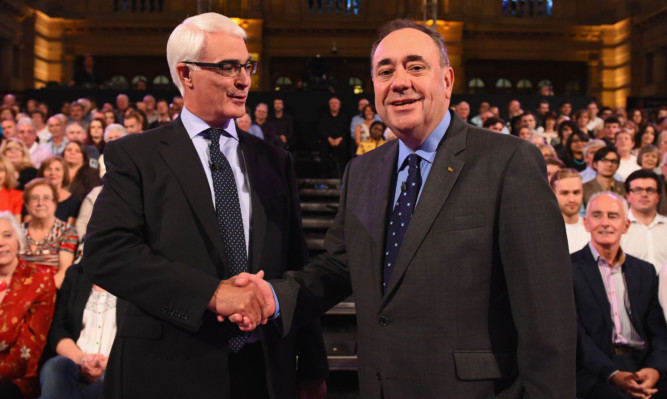The BBC should review its approach to the coverage of “controversial political issues” in Scotland in the wake of last year’s referendum, according to an audience panel.
In the corporation’s annual review, the Audience Council Scotland said some network programmes had appeared to adopt what was described as an “Anglified perspective” during the independence debate and focused too much on the official campaigns “at the expense of the wider civic and community engagement”.
The council, which advises the BBC Trust, said BBC Scotland should be given greater authority and resources to commission programmes for Scottish audiences and review its approach to the coverage of controversial political issues “to ensure that perceptions of impartiality remain strong across all audiences”.
Analysis from audience councils and focus groups found 48% of people in Scotland think the BBC is good at representing their life in news and current affairs content, compared with 61% in England, 61% in Northern Ireland and 55% in Wales.
The BBC annual review read: “The BBC has a key role to play in ensuring it represents the nations in news, drama and entertainment, and our research shows that over half feel that the BBC represents their nation or region in its content, and supports minority languages.
“Nonetheless there is still some way to go, particularly in Scotland. People are accessing content using a variety of platforms where only around 50% of the audience feel that their nation is effectively represented.”
The Audience Council Scotland praised a series of documentaries on the referendum and the online resources available, but added: “Members questioned whether, overall, the coverage had captured the popular nature of the campaign and the increased role of social media.
“The council also felt that BBC network programmes, overall, did not engage with the issues until too late a stage, and that some had been less well informed, and that this diluted the value of the coverage at both Scottish and UK levels.
“There was some audience perception that network correspondents were increasingly used in place of BBC Scotland correspondents in the final weeks of the campaign.
“Some council members believed BBC coverage had focused too much on the official campaigns, at the expense of the wider civic and community engagement; and that certain network programmes had appeared to adopt what was described as an ‘Anglified’ perspective.”
The annual review also shows that the referendum and the Commonwealth Games helped the BBC reach record audiences in Scotland last year.
The live debate between the SNP’s Alex Salmond and Better Together’s Alistair Darling in Glasgow was watched by 860,000 viewers in Scotland, a third of the TV audience in the country and the highest ever for a political debate in Scotland.
Coverage of Glasgow 2014 reached 3.6 million people – 78% of the audience in Scotland – with the opening ceremony alone attracting a peak of 1.8 million Scottish viewers and 9.3 million across the UK.
Audiences for the opening and closing ceremonies of the Commonwealth Games were the third and fourth highest in Scotland since 2002, beaten only by the opening and closing ceremonies of the 2012 London Olympics.
Around 4.7 million people used the BBC Scotland News website last year, with a record number of unique users – 13.2 million – visiting the site in the week of the referendum vote.
BBC trustee for Scotland Bill Matthews said: “Last year the BBC had its busiest year in Scotland with some truly memorable, high-quality programmes.
“Events such as the Commonwealth Games and the independence referendum brought viewers from around the globe to Scotland, and the BBC covered these events for UK and international audiences with great professionalism.
“Noting that BBC television reached a greater proportion of the audience in Scotland than it did across the UK as a whole, Audience Council Scotland still feels that more should be done in BBC output to reflect the unique cultural and political landscape of Scotland to audiences both in Scotland and across the UK.”
